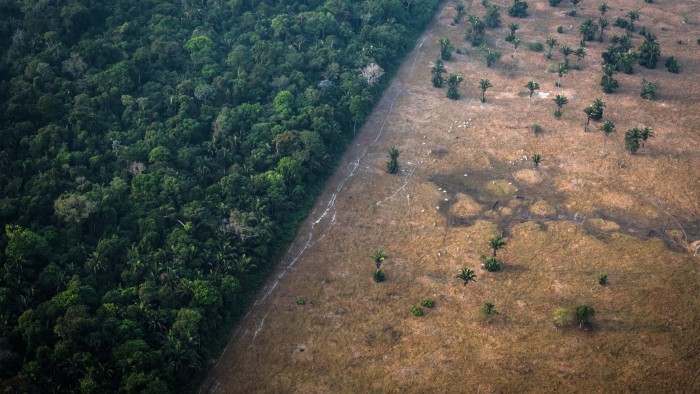Brazil’s environment minister is battling recent legislation that could gut national environmental protection rules, three months before the country hosts the world’s most important climate negotiations.
Marina Silva said the bill — rammed through congress by the powerful farming lobby late at night before a summer recess — represents the biggest potential setback to environmental protection in Brazil in four decades.
“The world today doesn’t need less environmental protection, it needs more protection,” she told the Financial Times in an interview at her ministry. “Brazil has already shown that it is possible to develop and protect at the same time.”
The law’s provisions, some of which were inserted at the last minute, would allow the fast-tracking of approval for projects deemed nationally strategic. Medium-sized projects with a medium environmental impact could be self-certified, as could many farming proposals.
At stake is not only the Brazilian environment but also the country’s international reputation ahead of the UN COP30 climate summit in November in the Amazonian city of Belém.
Silva said “it certainly worries us” that the newly passed legislation conflicts with environmental obligations under a landmark trade treaty awaiting ratification between the Mercosur bloc of Latin American countries and the EU, a view confirmed by EU officials. “This law is really not helpful,” one European diplomat said.
UN human rights experts have called on President Luiz Inácio Lula da Silva to veto parts of the bill.
But Silva said the government planned instead to propose changes before an August 8 deadline for presidential approval, and negotiate revised legislation with congress to find a compromise.
“I always believe in the power of dialogue,” she said. “Society is highly mobilised to get the changes which will be made by the federal government [to the bill] accepted by congress.”
Silva’s strategy is also an admission of the political reality. The law passed the lower house in mid-July by 267 votes to 116 — a majority of more than the two-thirds needed for legislators to override a presidential veto. Officials at her ministry admit it would be “very difficult” to veto the entire bill.
Greenpeace says “the bill opens the door to illegal expansion [of agribusiness], fuels forest destruction, and exacerbates the climate crisis”, adding that it “could lead to a deforestation explosion”.
Indigenous communities are alarmed that environmental reserves that are in the process of being demarcated, a process that can last many years, would have their protection removed.
In the village of Sawré Muybu, in the Amazonian state of Pará, the bill’s passage was met with dismay by Juarez Saw, cacique, or local leader, of the Munduruku people.
The territory is in the process of being demarcated as an indigenous reserve, but locals complain of intrusions by unlicensed loggers and mercury contamination from illegal gold mining.
“[The law] is our biggest worry right now. We fear it will facilitate more invasions and companies entering the territory,” said Saw. “This thinking will end the Amazon,” he added. “The people there in Congress are blind.”
The law has also fuelled criticisms of Lula’s administration by environmental activists for increasing domestic fossil fuel extraction at the same time as the country is seeking to play a global climate leadership role.
 Environment minister Marina Silva: ‘The world today doesn’t need less environmental protection; it needs more protection’ © Bloomberg
Environment minister Marina Silva: ‘The world today doesn’t need less environmental protection; it needs more protection’ © Bloomberg
But Silva argued that those hoping that projects such as oil drilling in the mouth of the Amazon river basin could now speed ahead without environmental assessment were mistaken.
“According to my understanding this is an illusion because it has no legal basis and would be challenged in court,” she said.
The same applied to the paving of the BR-319, a 1970s-era dirt highway running south-west from Manaus through the rainforest towards the border with Bolivia.
“There’s a belief among some that the BR-319 could avoid environmental licensing which . . . has no legal basis because it’s a high impact project which will need very rigorous governance and state presence,” she said.
Silva aims to convince legislators that inviting legal challenges is not in the interests of those pushing for easier approvals.
The minister noted the Amazon, the world’s largest remaining rainforest, was already suffering from the effects of climate change.
“For the first time, deforestation due to fire was greater than deforestation through clear cutting,” she said. “We are succeeding . . . in containing the cutting down of forest but we aren’t managing to deal with the consequences of higher temperatures which are leading the forest to lose humidity.”
Silva has resigned before from a Lula government, stepping down in 2008 after complaining of the difficulty of implementing a green agenda.
Recommended
This time, she said, is different because of Lula’s personal commitment to ending deforestation by 2030 and setting more ambitious climate targets for Brazil. “President Lula has put down a lot of ‘green lines’, which give me the comfort to continue serving the government,” she said.
Despite her uphill fight against a sceptical congress, some of whose members have insulted her, Silva said she believed in engagement rather than condemnation.
“For a democrat who believes that things are resolved through convincing people, even in hostile situation, we have to persist,” she said.
“For me, protecting the environment is not being against development. It is being in favour of development which lasts, development which takes account of the reality of nature’s laws.”


